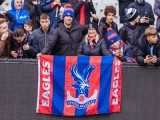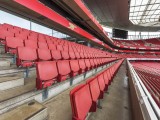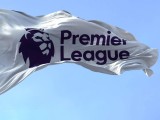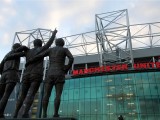As anger grows and action intensifies, we explore what exactly has caused the discontent and budding revolution at Manchester United
By Craig Humpage
Football Writer, Sporticos
Published on Thursday 6 May 2021
Since the takeover of Manchester United by current owners the Glazers back in 2005, resentment has been growing among supporters. Many knew from the start the direction this was all heading. They wore green and gold scarves in defiance, the colours of Newton Heath, the original name of their club which would become Manchester United in 1902. Many more saw futility in any attempt to save their beloved club and broke off to form a new one, FC United of Manchester. There had been protests, boycotts, even attempts by supporters groups to facilitate the club's purchase by wealthy investors.
All cries had fallen on deaf ears and the game seemed resigned to the fact that one of it's greatest ever luminaries had become simply a cash cow, a shell of its former self. That was until news broke of the European Super League, a concept so heinous it united the most tribal of species, the football fan. When the six "biggest" clubs in England signed up to join Florentino Perez's attemped coup, supporters and pundits alike erupted in condemnation. There were frenzied rants on the telly and protests at the grounds as the football world came together against a common enemy.
When the bad PR was too much for the owners in question, they all quickly dropped the idea and hoped the 24 hour news cycle would save them. In some cases they were right, but in others the outrage hasn't died down. For United fans, this was simply the straw that broke the camel's back. Many of them, especially those in the local community, have been desperate for change for over a decade. Their owners have grossly offended them with everything from their naked greed to their poor transfer policy. This fiery reaction has been a long time coming and is far from over as fans mobilise around different strategies to finally free their club from the grasp of the Glazer family.
But what exactly are fans angry about? It's a long list so you might want to grab a cuppa.
Debt, debt and more debt
You've probably heard about the current ownership's pilfering tendencies but you may not be au fait with exactly what has happened to the club financially over the past 16 years. In a takeover helped along by future Chief Executive Ed Woodward, the Glazer Family acquired the business with the help of some rather huge loans. At that time, the club was debt free and had been since 1931. In order to buy the club they took out said loans secured against Manchester United's own assets, meaning the responsibility for paying interest on those and indeed paying off the loans entirely fell squarely on the institution, not on the Glazers themselves.
So, just how much debt did they saddle the club with in order to become owners? Well while working at JP Morgan, Woodward nabbed them a £275m hedge fund loan at an initial 14.25% interest from a combined three hedge funds including Citadel (one for the GME fans out there). That particular debt had already grown by £79.1m just a year later. They made up the rest of the money with a £265m bank loan. The combined debts would require annual interest payments of £62m, and who would be paying for those? Manchester United Football Club, not the Glazers. The family themselves bridged the gap with £270m of their own, they bought an entire institution while paying only a third of the cost from their own pockets.
For those who don't understand:
— Aidan Walsh 🔰 (@AidanWalshMUFC) May 2, 2021
• Glazers bought the club with a loan
• Transferred the debt of the loan to the club
• Have put £0 of their own money into the club
• All transfers have come from club revenue
• They have taken 2 billion from the club #GlazersOut
Being the commercial powerhouse it was and still is, Woodward (when later given a role at the club) and the Glazers claimed that the business was more than capable of paying off the hundreds of millions of pounds of debt and interest payments, while also competing at the highest level for players and managers and winning trophies. It simply wasn't and isn't the case. You could argue that they have at least done the latter. They've shelled out big time on players like they always could because of the huge commercial revenues the brand attracts. The difference is they used to sign big names while being a healthy, debt-free club. Now the debt stands at around £455m as the pandemic takes its toll. They've fallen far behind their rivals on the pitch, and continue to pay the price off of it.
The Crumbling Ruins of an Empire
As Gary Neville so passionately pointed out on Sky a couple of weeks back, Old Trafford has fallen into disrepair. "The Theatre of Dreams", as it was so often referred to by fans and commentators, has been the setting for some famous triumphs, domestic and European. It was once an emblem of their success, a shimmering 74,000 seater stadium which aptly resembled the team's success. During their 16 year reign, the owners have invested a measly £185m into the upkeep of the stadium and training facilities. Meanwhile, fans have watched on as clubs like Arsenal and Spurs move into their own brand new stadiums while their home becomes somewhat decrepit. Things move fast in football.
If that’s not enough, #MUFC have also had to pay another quarter of a billion pounds on loan repayments since 2010, again the highest in the Premier League, ahead of #AFC £211m (and the Gunners have new stadium to show for it). #THFC £756m is mainly to fund their new ground. pic.twitter.com/r4Mv5g6L8P
— Swiss Ramble (@SwissRamble) May 4, 2021
Old Trafford was once the destination for games at World Cup 66, Euro 96, FA Cup Semi Finals, but has not staged a showpiece fixture since the 2003 UEFA Champions League final and for good reason. The Sir Bobby Charlton Stand has a leaky roof, the seating is cramped, the bars and suites are symbols of the past, relics. Even the director's box is old school. For some fans that might not be the worst thing, one of the few remaining vestiges of that gritty, authentic football going experience. For many it is seen as intentional neglect on the part of their owners. In the lifetime of my generation, United have always been a big club leading the way, winning, building, innovating. Today their proud but worn out stadium signifies the extent to which their club has been gutted by owners who really don't care about them or their matchday experience, and just how far they've fallen behind their rivals.
Bad Decision After Bad Decision
The common argument you will hear made by defenders of the Glazers is that they have "backed" their managers in the transfer market. If by backed you mean spent the money the club itself generates every year, while injecting absolutely nothing of their own, I suppose you're right. If you take a look at the numbers it really is staggering how many different ways they have found to take money out of the club, while putting nothing in. When you compare this with some of the other owners, problematic as they may be, you get a sense of the frustration felt by fans.
Putting aside the dividend payments they give themselves (something no other Premier League club owner does), the "Directors' fees", the personal loans taken out against the club's name, and the laundry list of other ways the Glazers have found to profit from the club, even if you grant that "they" have invested in the transfer market, they've made a real hash of it. Since Ed Woodward took over from David Gill in the top chair in 2013, there have been some real embarrassments, and as the ones who chose to put him there, the Glazers are ultimately responsible for his failures.
In Woodward's first transfer window, David Moyes told him to look into Cesc Fabregas and Thiago among others, signings which would have been totally realistic in years gone by. He ended up with Marouane Fellaini above the going rate. Then there were the galacticos on whom they massively overspent on wages, fees or both. Names like Angel Di Maria, Radamel Falcao, Alexis Sanchez and others came and went contributing little on the pitch. Numerous other underwhelming signings were made of players who just couldn't cut it at United.
Some breakthroughs were made along the way. Zlatan Ibrahimovic could be described as a success at the club, despite marginalising promising young players in the process. Bruno Fernandes has been a revelation and more than lived up to his £47m price tag. For all the derision he receives, Paul Pogba is a world class player. Like many of his counterparts, he has likely suffered from mismanagement at the hands of Jose Mourinho and others. The acquisition of Daniel James, Aaron Wan-Bissaka and Harry Maguire can hardly be described as bad calls.
Nonetheless, the overall picture is one of chaos and not cohesion. Woodward has presided over some of the worst decisions in the history of the transfer market, locking the club into deals with huge wage packets for players far past their best or simply not good enough. He's often failed to lock down the players his coaches have really wanted and resorted to paying above the odds for mediocrity. Until Ole Gunnar Solksjaer took over, there was very little clear direction. At least United seem to have an identity now and are progressing as a team. Before that it's been a carnival of confusion and ultimately a period of stagnation for a club which at one time dominated English football.
Popular United fan and YouTuber Mark Goldbridge produced a Twitter thread detailing just a few of the most egregious cases of mismanagement which have cost, and will continue to cost, the club money and success.
One other way the Glazer's cost United success and money that never gets highlighted is in their terrible football business acumen. Here's a thread of examples.
— Mark Goldbridge (@markgoldbridge) May 4, 2021
1. Ander Herrera allowed to run down. 25 million player walks out the door for nothing. 25 million loss.
1/5
Woodward has been fond of signing players up to long term deals with hefty salaries, costing the club millions during his tenure. For all the carnage caused off the pitch financially by the Glazers' and Woodward's running of the club, things on the pitch are likely to have caused greater widespread reputational damage. As United continue to falter in their search for that elusive 14th Premier League crown, the question must be asked: in what way have fans benefitted from the Glazer's ownership?
Like Banging Your Head Against a Brick Wall
One of the biggest problems to come to light during the European Super League scare was just how little the owners of elite clubs engage with fans. This will have come as no surprise to most but it really is incredible the contempt to which they seem to hold the people who keep their businesses afloat. Or do we? It is becoming ever clear that to many owners the football fan, or "legacy fan" as we were described openly in the ESL's own documentation, is nothing more than an inconvenience, generating very little money in comparison to what they could get from their global fanbases, while moaning about silly things like history, culture and ethics.
Rory Jennings, YouTuber and Chelsea fan recently pointed out on the Kick Off (29:30) that for those running these businesses, the traditional fan is not the one who should be courted. Football was and always has been a sport for and by the working class. Most fans today are still part of that demographic, or perhaps the lower middle class. If they are lucky enough to afford a ticket to go to watch Manchester United, Chelsea or God forbid Arsenal, they aren't exactly flush with cash to splurge on merchandise, food and drink at the stadium. They are more likely to save up their money for a season ticket, go to watch the game and go home, or maybe to the pub for a pint. The American or Chinese tourist on the other hand is probably going to gleefully spend hundreds of pounds before, during and after the match on all manner of products. They are the customer worth chasing and that is what fans are now, customers.
It is this reality which is the driving force behind the ESL clubs' desire to break away and form their own league, one which they can market to overseas markets at will. The Glazers and many like them are looking to the "future football fan", the one who lives in Australia or Japan. That fan will give them more money which they can use to pay off their debts, and increase their dividends. Pre-season tours have been going on for years as clubs, with United at the forefront, try to capitalise on global interest and grow their brands. This in itself is not a huge problem. It generates wealth for the clubs which they can invest in their teams, enabling them to compete for more trophies, while bringing their star players to adoring fans across the world. The problem is that the Glazers, Stan Kroenke (owner of Arsenal), Florentino Perez and their cohorts want to upend the entire system and make the entire sport into a pre-season tour, a commercial exercise for the sole purpose of generating more wealth for those few clubs and more importantly, their owners.
One clear result of this approach is the freezing out of the fans who live and breathe their clubs and for proof of this, look no further than the Glazers' recent refusal to attend a United fan forum. Joel Glazer, said to be a driving force behind the proposed Super League and prospective board member of the organisation, and the rest of the family decided to take a pass on answering questions at the forum. This is nothing new but given their statement only days before apologising for their involvement in the plot and admitting they need to be more communicative with fans, it was galling. To say with one breath that you need to engage more with fans and plan to do so, and then to reject an invitation to do that very thing days later is to make it perfectly clear that you have no intention of changing the status quo. They don't even care enough to go hardcore on the PR defensive. They just put out a bland statement of apology, and then continue with business as usual, ignoring the fans.
Perhaps fans have finally had enough of being treated like children.
Not sure any Man Utd fan has heard Avram Glazer speak a word in 16 years as co-owner. The new PL charter should insist on an open forum between owners and fans at least once a season, to force owners to listen and (maybe) answer... https://t.co/WzSQLJ2irq
— Mark Ogden (@MarkOgden_) May 4, 2021
United fans step up to the plate
When the European Super League fell apart all the plaudits were justifiably heaped on the Chelsea fans whose protest outside Stamford Bridge seemed to be a key catalyst in Roman Abramovic and the London club deciding to step back from proposals. That sparked a chain reaction which saw all six English clubs hand back their invitations to the party. Since then protests erupted at other clubs including Arsenal and Liverpool demanding the immediate removal of their American owners. However, it was United fans who really took it to another level, one which they hope their counterparts at other clubs can match or even beat as the collective fight against greed in our game continues.
It started with protests at the training ground, and developed into protests at the stadium with fans breaching the barricades and getting onto the pitch to make their voices heard, eventually getting their game against Liverpool called off. It didn't take long for those working in the legacy media to turn on them because their precious match was gone, completely unable to see the bigger picture. Those same pundits who were outraged by the ESL quickly jumped to vilify the fans at Old Trafford and paint them as violent extremists. The likes of Alan Shearer and Graeme Souness were particularly disappointing. This can't be said for everyone as several pundits did back the fans, in particular Gary Neville. New media voices around the game online stood almost unanimously in support of the actions the fans took. Nobody supports violence of any kind but the majority of fans acted peacefully and made their voices heard by successfully getting the game between United and Liverpool postponed.
Sky pundits will be quick to tell fans to calm down and just go on Twitter to voice their outrage, knowing full well that nothing will get done if they do so, but hey at least then they will have a match to analyse and that's the main thing. The actions taken at Old Trafford last weekend were too big to ignore and those fans deserve huge credit for that.
Since then the plan of action has accelerated further. Fans are now mobilising online to target the clubs commercial partners. They've organised boycott campaigns, Insiders close to the Glazer family have disclosed that it's this approach which is most likely to get their attention. They released a statement which read in part: "As commercial partners of the Glazer family, you are legitimate targets of the global fanbase because the combined £279m per annum you pay will not go towards investment in the squad to compete with the best clubs United now trail,"
🗞 On Tuesday afternoon, this approach intensified, when a group of anonymous #mufc fans on social media posted an open letter, tagging in the club’s sponsors, warning that they are deemed to be “legitimate targets” due to their association with the club. [@TheAthleticUK] https://t.co/8M4vuNbfca
— UtdDistrict 🔰 (@UtdDistrict) May 5, 2021
The plan is picking up steam as it continues to be shared on Twitter by supporters. This approach, along with continued demonstrations at the stadium and training ground, the input of YouTubers and content creators with huge audiences, and the voices of TV pundits loyal to the cause like Gary Neville, will hopefully lead to significant change at the club in the coming months.
Many Manchester United fans and football fans in general will hope the club is sold by the Glazers but that day seems very far off as they demand up to £4bn to listen to offers. The fight has only just begun.
Stay up to date with everything related to watching football
Get the latest news and information about where to watch matches from your favourite clubs from across the world on TV or live streaming on our dedicated live football page. There will find links to trusted, legal sources of live streaming, TV channel info, data, statistics and much more.
Click here to check it out.












